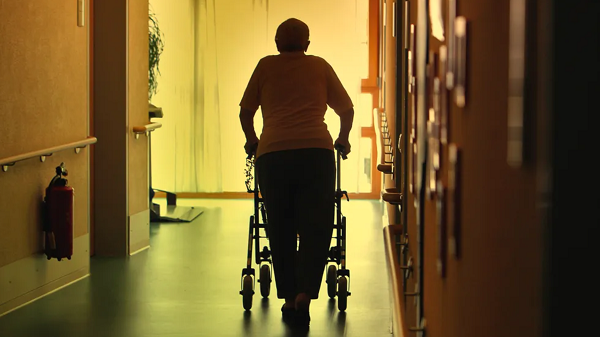Where Nursing Homes Hide Their Profits
By Merrill Goozner
April 8, 2024
 Last June, an elderly stroke survivor residing at Chicago’s Lakeview Rehab and Nursing Center fell to the floor while being transferred by mechanical lift from his bed to a shower chair. The fall broke his leg in two places. A single nurse’s aide had texted her coworkers three times seeking help before attempting the lift. None responded. The nurse — in a clear violation of a requirement that two aides conduct any high-risk transfer — went ahead on her own.
Last June, an elderly stroke survivor residing at Chicago’s Lakeview Rehab and Nursing Center fell to the floor while being transferred by mechanical lift from his bed to a shower chair. The fall broke his leg in two places. A single nurse’s aide had texted her coworkers three times seeking help before attempting the lift. None responded. The nurse — in a clear violation of a requirement that two aides conduct any high-risk transfer — went ahead on her own.
It wasn’t an isolated incident at the 178-bed facility. Since the beginning of 2021, federal regulators fined Lakeview Rehab, which is run by privately-owned Infinity Healthcare Management, more than $250,000 for 10 serious violations, according to the government’s Nursing Home Compare website. The facility earned just one out of five stars for quality, the lowest possible rating.
In response to the deteriorating conditions at nursing homes nationwide, regulators have proposed bare-minimum staffing standards. The facilities have cried poverty, claiming they can’t afford it. But in fact, researchers have found many of these private equity-owned operations, including Lakeview, are funneling funds — almost all of which come from Medicare and Medicaid — to pay exorbitant fees to their affiliated companies.
In short, nursing home owners are poaching government funds that could be used to increase staffing levels to line their own pockets with inflated real estate and management fees.
The repeated safety violations at Lakeview Rehab are typical of an industry that has long been known for skimping on staff and paying near-poverty wages to its workers. Poorly regulated by understaffed state public health departments, the for-profit owners who now control nearly three-quarters of the nation’s 15,000 nursing homes shrug off the minimal fines while complaining they are broke and can’t staff their facilities properly, because of inadequate reimbursement by government agencies.
However, as several studies and investigations have documented in recent years, private equity-owned nursing home chains like Infinity Healthcare Management are highly lucrative. Their owners have created an affiliated network of outside real estate, management, and service firms that extract huge profits while claiming the nursing home itself is either broke or barely profitable.
This is money that should be used to hire more staff, raise pay, and improve working conditions, which would go a long way toward bettering the health and living conditions of the elderly and disabled Americans who live there.
A Need For More Nurses
The nursing home industry has undergone a massive upheaval in recent years, one that began well before the COVID-19 pandemic led to the deaths of more than 200,000 residents and 1,600 staffers. Large, shareholder-owned chains like Kindred and HCR ManorCare left the field in 2017 and 2018, respectively. A few dozen mid-sized private equity firms headquartered far from Wall Street emerged to take their place.
This shakeup has exacted a huge toll on nursing home quality.
“These firms, such as Arcadia Care, Brius Health Care, Aperion Care, and Infinity Healthcare Management, perform poorly in the federal government’s nursing home rating system, averaging only 2 on a 1 to 5 scale,” according to a recent report by Good Jobs First, a watchdog group that tracks fines imposed by government agencies. “These bad actors — some of which have doubled or tripled in size in recent years by purchasing facilities sold off by more established operators — have been averaging over $100,000 in penalties per facility, nearly three times the national level.”
To improve safety and the quality of care delivered at nursing homes, the Biden administration last September proposed a minimum staffing ratio for nursing homes. In an attempt to expose the machinations of the industry’s private equity owners, the proposal also called for greater financial transparency. The proposal comes after decades of protests over the poor quality at the nation’s nursing homes by patient advocacy groups and unions representing the homes’ beleaguered and poorly paid staff.
Under the proposed rule, nursing homes must always have a registered nurse on duty, up from the current eight-hours-per-day standard. The total number of registered nurses must equal at least .55 hours per resident per day. The ratio for certified nurse aides, who help residents with most of their daily living chores like eating, bathing, mobility, and toileting, must equal at least 2.45 hours per resident per day.
Though 35 states already have…
[READ THE COMPLETE ARTICLE HERE]
